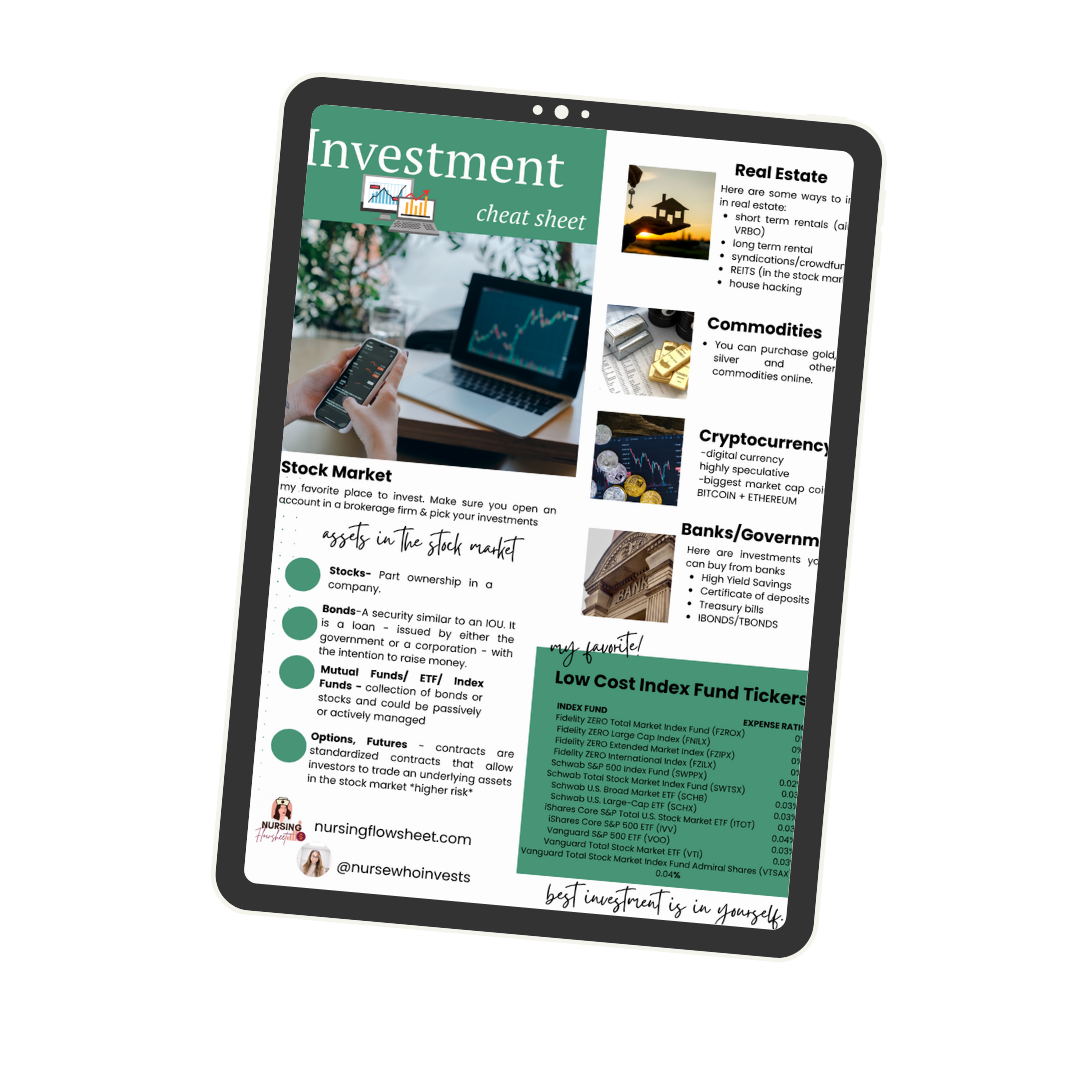One of the most common question I get whenever I post something about investing as a nurse is: “What investment type should I invest in?” There are a lot of investments beyond a 401k that most nurses are not aware of. Over the year of investing, I have diversified my investment options across different assets and in this post, I will share with you different investments you can make as a full time working nurse.

Different Investment Types
Stock Market Assets
Investing in the stock market can provide significant returns over time. Consider starting with low-cost index funds or exchange-traded funds (ETFs) that offer diversified exposure to the market. As a busy professional, you may appreciate the hands-off approach these investments offer, allowing you to focus on your career while your money works for you in the background.
Read: How to Get Started with Investing as a Nurse
Real Estate
Real estate can be a lucrative investment, offering both rental income and potential appreciation in property value. While becoming a landlord may require some initial time and effort, it can be a rewarding long-term investment strategy. If managing properties seems daunting, you can explore real estate investment trusts (REITs), which allow you to invest in real estate without the hassle of property management.
Education & Self Improvement
Investing in your own education and professional development can lead to higher earning potential and career advancement opportunities. Consider pursuing specialized certifications or advanced degrees that align with your interests and career goals. Not only can this enhance your skills as a nurse, but it can also increase your earning power over time.
Businesses (Yours or Startups)
As a full-time nurse, you may have unique skills and experiences that can be monetized outside of your primary job. Whether it’s starting a blog, offering consulting services, or launching a healthcare-related business, exploring side hustles and entrepreneurship can diversify your income streams and accelerate your path to financial independence.

Why you need to Diversify your Investments
Diversification is a fundamental principle of investing that involves spreading your investments across different asset classes, industries, and geographic regions. There are several key reasons why diversification is important:
- Risk Reduction: Different types of investments behave differently under various market conditions. By diversifying your portfolio, you can reduce the overall risk of your investments. If one asset class or investment performs poorly, other investments may help offset those losses, minimizing the impact on your portfolio’s overall value.
- Protection Against Volatility: Financial markets can be volatile, experiencing fluctuations in value over short periods. Diversification can help cushion the impact of market volatility on your portfolio. Assets that perform well during market downturns, such as bonds or gold, can provide stability and balance out the potential losses from riskier assets like stocks.
- Maximizing Returns: While diversification aims to reduce risk, it also has the potential to enhance returns. By spreading your investments across different asset classes, you have the opportunity to capture gains from various sectors or regions that are performing well. This can help optimize your portfolio’s overall return potential over the long term.
- Capital Preservation: Diversification helps protect your capital by minimizing the likelihood of catastrophic losses. Concentrating your investments in a single asset class or industry exposes you to higher levels of risk. If that particular sector experiences a downturn, your entire investment portfolio could suffer significant losses. Diversification helps safeguard your capital by spreading it across multiple investments.
- Adaptability to Changing Market Conditions: Financial markets are dynamic and subject to constant change. What performs well today may underperform tomorrow. Diversification allows your portfolio to adapt to changing market conditions by ensuring you have exposure to a wide range of assets. This flexibility helps you navigate different economic environments and reduce the impact of unpredictable events on your investments.
- Psychological Benefits: Diversification can also provide psychological benefits to investors. Knowing that your investments are spread across different assets can help reduce anxiety and emotional decision-making during periods of market turbulence. It instills confidence in your investment strategy and encourages a disciplined approach to long-term investing
In conclusion, as a full-time nurse, you have a rewarding and demanding career that provides stability and fulfillment. By strategically allocating your income towards investments, you can build long-term financial security and create opportunities for wealth accumulation. Whether it’s contributing to retirement plans, investing in the stock market, or pursuing additional education, make informed decisions that align with your goals and aspirations. Remember, building wealth is a journey, and patience and consistency are key.






